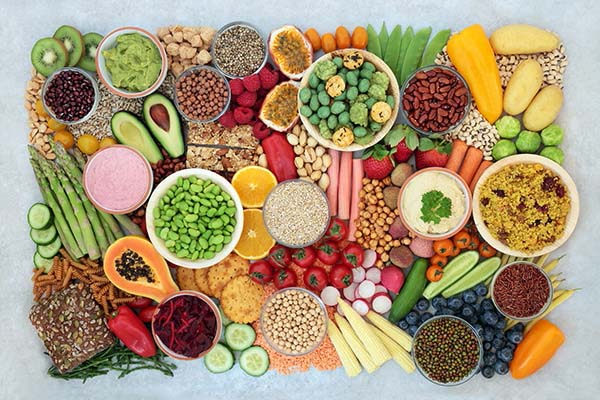4 Ways a Plant-Based Diet Can Improve Your Gut Health

If you feel like your three square meals are making actual squares in your gut, it might be time to add a round of greens.
Greens – and oranges, reds, yellows, and even browns. These are the colors of the plant-based foods your body craves – not just fruits and vegetables but also whole grains, nuts, and beans. And the key location through which these nutrients must travel, in order to benefit your body, is square in your gut.
That’s where your gut microbiome lives. And it loves to feed on plants.
Hold Up. Something’s Living In My Gut?
The gut microbiome is not simply a “thing.” It’s a complex community of trillions of bacteria, viruses, and fungi that break down everything you eat as it passes through your intestines, from lettuce to doughnuts.
Ideally, most of these organisms are “good” bacteria that help your intestinal cells digest nutrient-rich foods. Good bacteria also help prevent disease-causing bacteria from sticking to your intestines and causing a bunch of health issues, such as bloating, constipation, and more serious conditions like inflammatory bowel disease.
What you eat helps determine how many “good” and “bad” bacteria live in your gut.
Is Eating a Diet Heavy in Plants Worth All the Hype?
If you’re eating plenty of whole fruits, vegetables, and other plant-based foods with your meals, then you’re entire body should perform better. And it all starts in your gut. Here’s how:
Plants help reduce inflammation. When the intestines become persistently inflamed, it is called inflammatory bowel disease (IBD). Fruits and vegetables contain antioxidants and natural fibers that can prevent inflammation, and therefore the risk of IBD.
Plants keep things moving. Plant-based foods move slowly through your digestive system, so the nutrients are better absorbed and you feel more full. This can keep your weight in check and also reduce the risk constipation, which can lead to hemorrhoids.
Plants help root out the causes of colon cancer. The antioxidants in plant foods can protect your cells from free radicals that can raise your risk of cancer. A 2022 study found that men who followed plant-based diets had lower risks of colorectal cancer.
Plants can reduce acid reflux. Fruits and vegetables can literally make it easier to swallow. Recent studies conclude that the prevalence and severity of symptoms associated with gastroesophageal reflux disease (GERD) are lower among vegetarians.
Tips for a Greener Gut – While Keeping the Steak Knife
A plant-based diet does not have to be a plant-exclusive diet. Beans, grains, nuts, lean meats, and oily fish like salmon help round out the benefits that plants provide. The popular Mediterranean diet is based on plants.
These tips can help you get the most from your plant-based diet.
Be sure they’re unprocessed plants. There are plenty of fruit- and veg-based snacks out there, but be wary of the ingredients. Those dehydrated veggie sticks and fruit gummies can contain lots of fats, sugars, and artificial ingredients. Opt for the whole carrot stick or apple.
Create plant combo meals. Research suggests the nutrients in plant-based foods work together to reduce disease. So combine fruits, vegetables, legumes, and grains in each meal. Also, be sure to get enough vitamin B12, which is found in animal products including oily fish and yogurt.
Give meat a supporting role. Rather than making meat the main attraction of your meal, use just a small amount to flavor the dish. Add beans or grains for bulk, and load at least half your plate with vegetables and fruits. The “Meatless Mondays” movement can inspire ideas.
Plant the Seeds to Better Gut Health
When the gut microbiome is firing off on all six cylinders, it will put good nutrients to work more effectively, but it’s up to you to feed it those good nutrients.
If you already follow a plant-rich diet and experience ongoing gastrointestinal discomfort, including abdominal pain, diarrhea, blood in your stool, or sore throat, a call to your doctor might be in order. Together, you can square away the issue.
You can request a visit with one of our doctors here. You can find more tips on eating a plant-based diet here.

